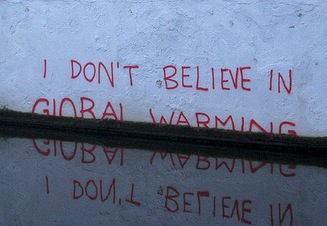Climate Pause—For Thought and Action
Those who question the seriousness of the threat climate change poses have strange notions of the risks they think are acceptable.
By Kieran Cooke, Climate News NetworkThis piece first appeared at Climate News Network.
LONDON — The latest findings from the Intergovernmental Panel on Climate Change (IPCC) has echoes of the old joke about a man who phones up his doctor for the results of recent tests.
“Do you want the good news or the bad news?” asks the doctor. “Well”, says the patient. “Maybe I should have the good news first so I’m in an optimistic frame of mind.” “OK”, says the doc. “You’ve got 24 hours to live.”
Understandably, the man is shocked. “And that’s the good news?” he says, his voice all shaky. “So what’s the bad news?” “I forgot to call you yesterday”, replies the doctor.
Behind all the careful scientific language of the IPCC’s report on climate change – issued late last week – there’s a very clear message.
The planet – and us humans – are in severe trouble. If action isn’t taken now, climate change is going to wreak havoc.
Where the IPCC report thankfully differs from the story of the poor patient and his doctor is that we still have time – if not to put things right, then at least to avert the more serious impacts of global warming.
But there can be no more prevarication, no more stalling.
Back to square one
“Climate change is a long-term challenge but one that requires urgent action, not tomorrow but today and right now, given the pace and the scale by which greenhouse gases are accumulating in the atmosphere”, says Achim Steiner, head of the UN Environment Programme.
Yet reaction to the IPCC’s findings – the first such assessment on climate change to appear for seven years – has been muted. Politicians make statements about the need for action on the climate and then go back to dealing with other issues and short-term political agendas.
The report quickly dropped off the global news chart. Like rabbits caught in the headlights, few people – especially the world’s leaders – seem to know what to do next.
The IPCC states the scientific evidence, it does not recommend courses of action. Rajendra Pachauri, the IPCC chairman, asked about how to tackle the upsurge in greenhouse gases, did venture to say the market and pricing carbon could be “an extremely effective instrument “ in cutting emissions.
That doesn’t sound very encouraging. So far, carbon trading and the operations of the market have done nothing to stem the emissions tide. The world’s most established carbon trading system, the EU’s Emissions Trading Scheme (ETS), has been largely ineffective and the price of carbon is still on the floor. In Australia a newly elected government has pledged to get rid of the country’s carbon trading scheme.
Ask the fossil fuel industry a similar question about cutting emissions and there will be talk of carbon capture and storage and investments in new energy technologies. In reality, carbon capture has gone nowhere and has received little investment compared to the billions spent on exploiting fossil fuels. And most of the big fossil fuel industries are divesting rather than investing in alternative, cleaner energy technologies.
Meanwhile, the deniers have been trying, once again, to sabotage any action on cutting emissions and averting further warming. The IPCC, they say, is “only” 95% certain that warming is caused by human activity.
The true sceptics
If the medical experts say they’re 95% certain your deteriorating state of health is caused by too much drinking, you probably go teetotal right away – if you care about your future.
If an insurance company warns that a house you’re considering purchasing has a 95% chance of being flooded, you likely run away from the deal, very fast.
Not so the deniers: they’ll happily drink themselves to death – while watching the flood waters rise.
The deniers say the IPCC and its scientists are part of an international conspiracy seeking to undermine the present energy structure and fooling humanity into thinking climate change is a threat.
More than 250 scientists from 39 countries were directly involved in compiling the latest IPCC report. They examined more than 9,000 scientific papers and received nearly 55,000 comments on their work, all of which had to be examined carefully.
Scientists are the true sceptics: they argue, they analyse, they disagree. They couch their findings in very careful language, full of caveats. Yet they’ve reached a consensus.
“Climate change challenges the two primary resources of humans and ecosystems – land and water. In short, it threatens our planet, our only home”, says Thomas Stocker, one of the main compilers of the latest report.
The world has been warned. The time for action is now.
Your support matters…Independent journalism is under threat and overshadowed by heavily funded mainstream media.
You can help level the playing field. Become a member.
Your tax-deductible contribution keeps us digging beneath the headlines to give you thought-provoking, investigative reporting and analysis that unearths what's really happening- without compromise.
Give today to support our courageous, independent journalists.






You need to be a supporter to comment.
There are currently no responses to this article.
Be the first to respond.